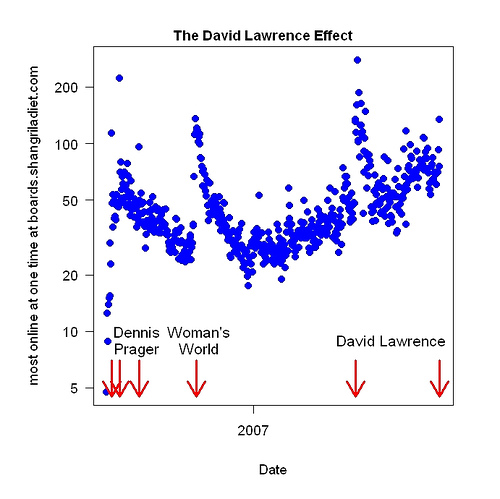Two days ago I was on the David Lawrence Show, which Mr. Lawrence produces in his own apartment, in Burbank. This was the second time; the first was in June. The show lasts three hours and consists of three interviews. Between my first and second appearances on his show, Mr. Lawrence stopped doing regular shows to concentrate on acting. He now does new shows now and then.
During my second appearance, he told me that radio was going downhill even faster than network television. That may be, I said, but your show had a much bigger impact on interest in my diet than almost any other interview I’d done, TV or radio — and I’d done about 50. He was surprised. Really, I said, I’ll make a graph and send you a copy. Later he asked me to compare his show to the other radio shows I’d been on — what was the percentage difference between the impact of my show and the other shows, he wondered. “2000%” I said. “20 times?” he said. Yeah, I said, maybe even 50 times. He looked surprised.
Here is the data.

This shows the maximum number of people reading the Shangri-La Diet forums at any one time for each day. (This is an easy-to-compute proxy for the number of distinct visitors.) The first media to have a big effect was a 35-minute interview on the Dennis Prager Show, which was replayed twice. The next was a Woman’s World article. The third was the first David Lawrence Show interview.
It is stunning that the David Lawrence Effect was of the same order of magnitude the effect of the Woman’s World article. Woman’s World, of course,is a huge operation, with millions of copies sold each week.
After the David Lawrence effect wore off, the function continued its steady climb at roughly the level you would extrapolate from before the DL effect started. My interpretation is this: As persuasive as that show turned out to be, and as large its audience — its effect was small compared to the total effect of word of mouth, which is what is pushing interest up.
